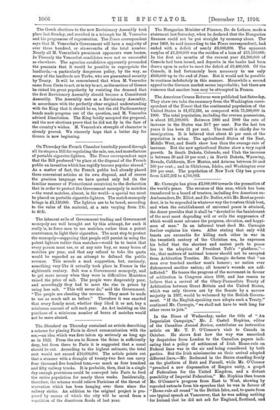Mr. Carnegie has given 22,000,000 towards the promotion of the
world's peace. The revenue of thin sum, which has been transferred to a board of trustees, including five American ex- Ambassadors, Dr. Elliot, and Dr. Butler, with Mr. Root as presi- dent, is to be expended in whatever way the trustees think best, and when the establishment of universal peace is attained, the donor provides that it shall be "devoted to the banishment of the next most degrading evil or evils the suppression of which would most advance the progress, elevation, and happi- ness of man." In an informal trust deed Mr. Carnegie further explains his views. After stating that only wild beasts are excusable for killing each other in war in the twentieth century of the Christian era, he expresses his belief that the shortest and easiest path to peace lies in the adoption of President Taft's " platform,"— viz., that matters of national honour should not be excepted from Arbitration Treaties. Mr. Carnegie declares that "no man ever touched another man's honour ; no nation ever dishonoured another nation; all honour's wounds are self- inflicted." He traces the progress of the movement in favour of arbitration in Congress since 1890, and has reason to believe that a revival of the Olney-Pauncefote Treaty of Arbitration between Great Britain and the United States, which was only thrown out by the Senate by a narrow majority in 1897, would be welcomed by the British Govern- ment. "If the English-speaking race adopts such a Treaty," continued Mr. Carnegie, "we shall not have to wait long for other races to join."






















































 Previous page
Previous page